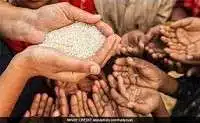
This article on poverty in India can also be used as poverty in India essay and poverty in India speech,. It focuses on poverty in India facts and effects. Additionally it suggests some causes for poverty in India with solution for poverty in India which can dopoverty eradication. Poverty and education have a close relation.
Poverty in India
A pledge to eliminate poverty has figured prominently in the election campaigns of all of India’s political parties since the country gained independence in 1947. Yet the ruling parties of all times have been accused of exploiting poverty rather than putting in place effective measures to tackle it. Poverty in India is not a problem, in fact, it has become a way of life in many areas of the nation.
Poverty implies a condition in which a person finds himself unable to maintain a living standard adequate for his physical and mental requirement. He even fails to meet his basic requirements of food and water. Poverty is one of the major problems in India.
It is the root cause of many socio-economic problems including population explosion, unemployment and child labour, and the rising graph of crimes. A variety of welfare and food security initiatives, along with rapid economic growth since 1991, has led to sharp reductions in extreme poverty in India.
However, those marginally above poverty line live a fragile economic life. Lack of basic essentials of life such as safe drinking water, sanitation, housing, health and infrastructure as well as malnutrition impact the lives of hundreds of millions of people.
High population growth rate is one of the major reasons of poverty in India. This further leads to high level of illiteracy, poor health The higher facilities and lack of access to financial resources. Also, high population growth affects the per capita income and makes per capita income even lower. It is expected that population in India will reach 1.5 billion by 2026 and then India will be the nation with the largest population in the world. But India’s economy is not growing at the same pace as its population. This means shortage of jobs. About zo million new jobs would be required for the large population. Number of poor will keep on increasing if such a big number of jobs are not created.
“A significant fact which stands out is that the numbers of India which have been under the British rule for the longest time are the poorest today” : said Jawaharlal Nehru, First Prime Minister of India. The colonial British rule laid the foundation for the long term and chronic poverty in India after they departed. They systematically drained India’s wealth and resources to make their own country prosperous.
Moreover, social inequality leading to exclusion and marginalisation of some communities has also led to some areas being dramatically poorer than the others. Unequal distribution of wealth and faulty economic reforms are also to be blamed for abject poverty in some areas. Dr Manmohan Singh once commented, “India happens to be a rich country inhabited by very poor people.” Traditionally, rural India has suffered more pangs of poverty than the urban areas.
Most of the land in the villages is owned by wealthy men on which other farmers work. They are not paid enough and are often exploited. Also, and rather, unfortunately, all economic developments have taken place in cities when the Majority of the population lives in villages and small towns.
Poverty alleviation should be the main target of the nation so as to make it a prosperous and developed country. Thus, poverty elimination is a matter of fundamental importance. There are two basic pre-requisites of a poverty eradication programme.
Firstly, reorientation of the agricultural relations is needed so that the ownership of land is shared by a larger section of the people. Secondly, no programme of removal of poverty can succeed in an economy plagued by inflation and spiralling rise in the prices of essential goods. A strong political will in the national leadership, to implement the much needed structural reforms, is a must to stop the spread of poverty. The test of our progress will not be in adding more to the abundance of those who have much; it will be in providing enough for those who have too little.